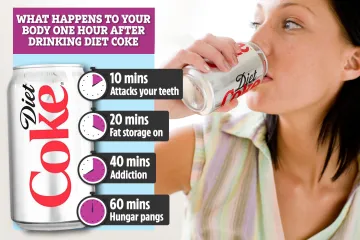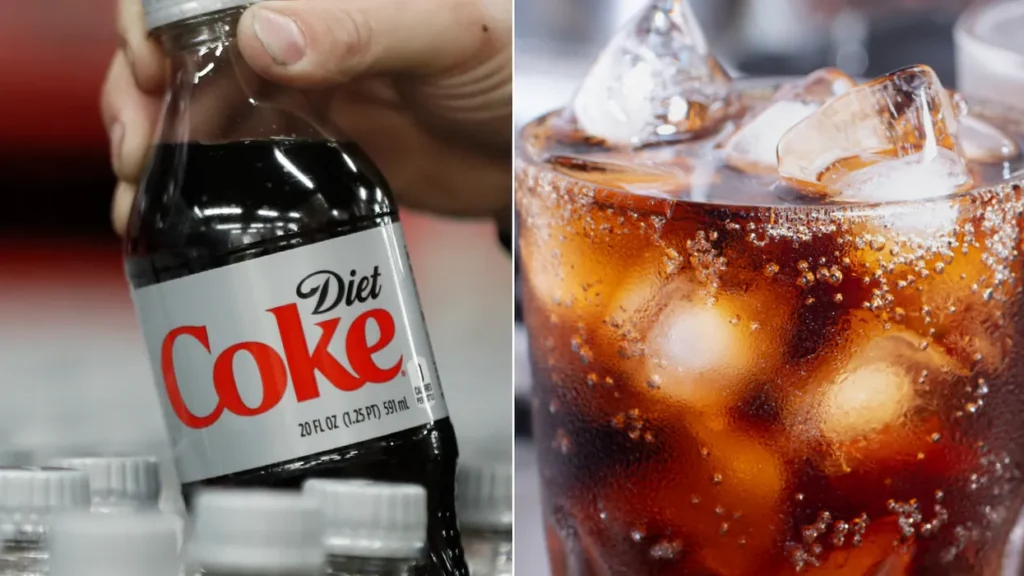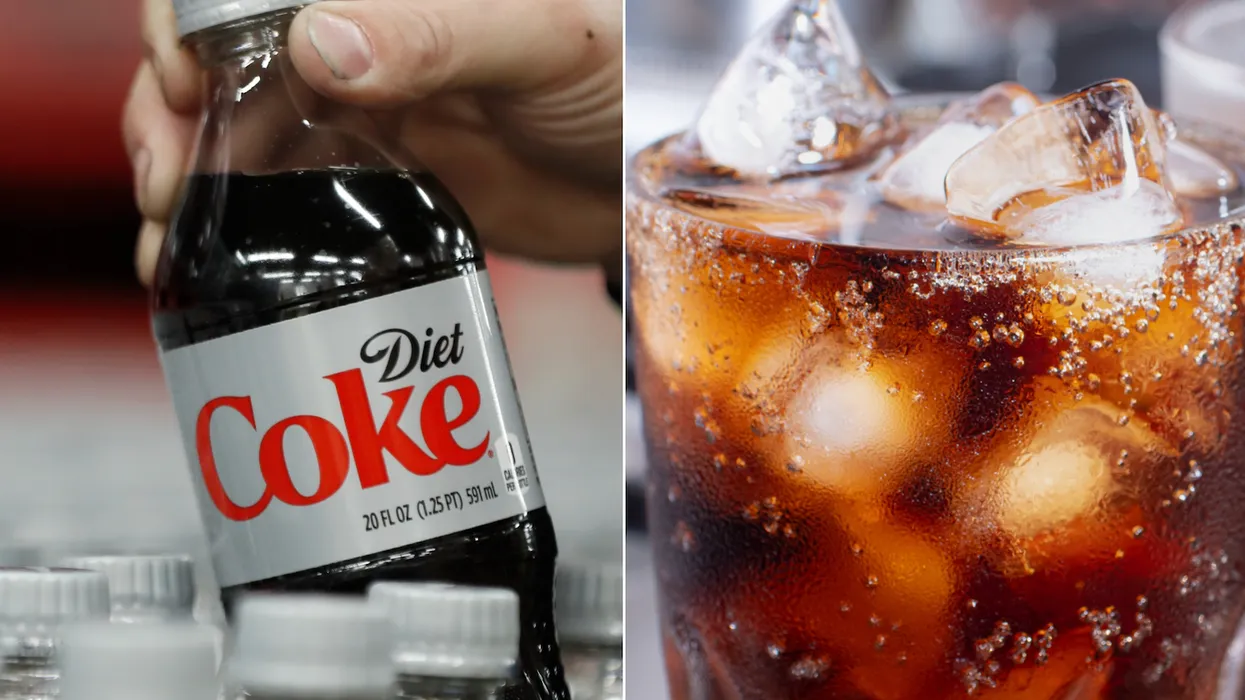Diet Coke, the iconic zero-sugar, zero-calorie soda, has been a staple in many households since its debut in 1982. Loved for its crisp taste and marketed as a guilt-free indulgence, it’s a go-to choice for those looking to cut calories without sacrificing flavor. But whispers about its health impacts—artificial sweeteners, caffeine, and mysterious “chemicals”—have sparked debates. Is Diet Coke bad for you, or is it a harmless treat when consumed in moderation? As a dietitian, I’ll break down the science, address common concerns, and provide practical guidance for safe consumption. Let’s dive into what’s really in that silver can and how it fits into a balanced lifestyle.
What’s in Diet Coke? Breaking Down the Ingredients
To understand whether Diet Coke is “bad” for you, we need to look at its ingredients. A standard 12-ounce (355 ml) can of Diet Coke contains:
- Carbonated water: The fizzy base of the drink.
- Aspartame: An artificial sweetener that provides sweetness without calories.
- Caramel color: Adds the signature brown hue.
- Phosphoric acid: Contributes to the tangy flavor and acts as a preservative.
- Potassium benzoate: A preservative to maintain freshness.
- Natural flavors: A blend of flavorings (the exact mix is proprietary).
- Citric acid: Enhances tartness.
- Caffeine: About 46 mg per 12-ounce can, roughly half the amount in a cup of coffee.
These ingredients are generally recognized as safe by regulatory bodies like the U.S. Food and Drug Administration (FDA) and the European Food Safety Authority (EFSA). But let’s examine the ones that raise the most eyebrows: aspartame, caffeine, and phosphoric acid.
Aspartame: The Sweetener Controversy
Aspartame, the artificial sweetener in Diet Coke, is one of the most studied food additives in history. It’s about 200 times sweeter than sugar, allowing Diet Coke to be sweet without calories. Despite its widespread use, aspartame has been the subject of health concerns, with some claiming it causes everything from headaches to cancer.
The science, however, tells a different story. The FDA has set an acceptable daily intake (ADI) for aspartame at 50 mg per kilogram of body weight. For a 150-pound (68 kg) person, that’s about 3,400 mg—equivalent to roughly 21 cans of Diet Coke per day. Most people consume far less. A 2017 review in Nutrition Reviews found no consistent evidence linking aspartame to cancer, neurological issues, or other serious health problems in humans when consumed within the ADI.
That said, a small subset of people with a rare genetic disorder called phenylketonuria (PKU) must avoid aspartame, as they can’t metabolize phenylalanine, one of its components. For the general population, aspartame is safe, but overconsumption could theoretically lead to mild side effects like headaches in sensitive individuals. Moderation is key.

Caffeine: A Jolt to Consider
With 46 mg of caffeine per can, Diet Coke provides a mild energy boost. For comparison, a standard 8-ounce cup of coffee has about 95 mg. The FDA considers 400 mg of caffeine per day safe for most adults, meaning you’d need to drink about nine cans of Diet Coke to hit that limit.
Caffeine can enhance alertness but may cause jitteriness, insomnia, or increased heart rate in sensitive individuals or when consumed in excess. If you’re already drinking coffee or energy drinks, factor in Diet Coke’s caffeine to avoid overdoing it. Pregnant women and those with heart conditions should consult a doctor, as their caffeine limits may be lower.
Phosphoric Acid: Bone Health and Acidity
Phosphoric acid gives Diet Coke its tangy kick but has raised concerns about bone health and tooth enamel. Some studies, like one published in the American Journal of Clinical Nutrition (2006), suggest that high consumption of cola beverages (including Diet Coke) may be linked to lower bone mineral density in women, possibly due to phosphoric acid’s interference with calcium absorption. However, the evidence is mixed, and moderate intake doesn’t appear to pose significant risks for most people.
As for teeth, phosphoric acid can erode enamel over time, especially if you sip Diet Coke slowly throughout the day. To minimize damage, drink it quickly, use a straw, and rinse your mouth with water afterward. For more tips on maintaining oral health while enjoying your favorite beverages, check out our article on Healthy Habits for Soda Lovers.
The Health Impacts: Separating Fact from Fiction
So, is Diet Coke inherently “bad” for you? The answer depends on how much you drink, your overall diet, and your individual health needs. Let’s address some common concerns.
Weight Management: Does Diet Coke Help or Hurt?
Diet Coke is marketed as a weight-friendly option, with zero calories and zero sugar. It can be a useful tool for those looking to reduce calorie intake, especially compared to sugary sodas. A 2014 study in Obesity found that replacing sugary drinks with diet versions helped participants lose weight when paired with a balanced diet.
However, artificial sweeteners like aspartame may not be a magic bullet. Some research, including a 2017 study in CMAJ, suggests that non-nutritive sweeteners might not significantly aid weight loss and could, in rare cases, increase cravings for sweet foods. The key is to use Diet Coke as part of a mindful eating plan, not as a free pass to overindulge elsewhere.
Gut Health and Artificial Sweeteners
Emerging research has explored how artificial sweeteners affect gut microbiota. A 2018 study in Molecules found that some sweeteners, including aspartame, may alter gut bacteria in ways that could influence metabolism. However, human studies are limited, and the clinical significance of these changes is unclear. If gut health is a priority, focus on a diet rich in fiber, probiotics, and whole foods. Our guide https://tastetrove.net/offers practical tips.
Long-Term Risks: Cancer and Chronic Disease
The fear that Diet Coke causes cancer stems largely from early aspartame studies, but decades of research have debunked this. The National Cancer Institute and World Health Organization (WHO) state there’s no clear evidence linking aspartame to cancer in humans. Similarly, claims about Diet Coke causing diabetes or heart disease lack robust support when consumed in moderation.
That said, Diet Coke shouldn’t replace water or nutrient-dense beverages like unsweetened teas or infused water. Over-reliance on diet sodas can crowd out healthier options, potentially leading to nutrient deficiencies over time.
Safe Consumption: A Dietitian’s Recommendations
Diet Coke can fit into a balanced lifestyle if consumed thoughtfully. Here’s how to enjoy it safely:
- Stick to Moderation: Limit intake to 1–2 cans per day to stay well below aspartame and caffeine safety thresholds. This also minimizes potential effects on teeth and bones.
- Pair with a Balanced Diet: Diet Coke lacks nutrients, so prioritize whole foods like fruits, vegetables, lean proteins, and whole grains. Check out our Meal Prep 101 Guide for ideas on building nutritious meals.
- Protect Your Teeth: Drink Diet Coke through a straw and rinse with water afterward to reduce enamel erosion. Avoid brushing immediately after, as enamel is temporarily softened.
- Know Your Limits: If you’re sensitive to caffeine or have PKU, consult a healthcare provider. Pregnant women should aim for no more than 200 mg of caffeine daily (about 4 cans).
- Mix It Up: Alternate Diet Coke with water, herbal teas, or sparkling water with fresh fruit. This reduces reliance on artificial sweeteners and adds variety.
- Listen to Your Body: If you notice headaches, digestive issues, or cravings after drinking Diet Coke, scale back and assess whether it’s the culprit.
Who Should Avoid Diet Coke?
While Diet Coke is safe for most, certain groups should exercise caution:
- People with PKU: Must avoid aspartame due to phenylalanine.
- Caffeine-sensitive individuals: May experience side effects like anxiety or insomnia.
- Pregnant or breastfeeding women: Should limit caffeine and consult a doctor.
- Children: Should prioritize nutrient-rich beverages over diet sodas.
If you’re unsure whether Diet Coke is right for you, a registered dietitian can provide personalized advice.
The Bigger Picture: Lifestyle Matters More
Diet Coke isn’t a health food, but it’s not a villain either. The occasional can won’t derail your health, especially if your diet is rich in whole foods and you stay active. The real risk comes from overconsumption or using Diet Coke to “offset” an otherwise unbalanced diet. As with most things, balance is everything.
For more insights on making informed food choices, explore our Nutrition Basics Hub. If you’re curious about other beverages, the Harvard T.H. Chan School of Public Health offers excellent resources on hydration and health.
Conclusion
Diet Coke can be enjoyed safely as part of a balanced lifestyle, provided you stick to moderate amounts and prioritize nutrient-dense foods. Its ingredients, like aspartame and caffeine, are safe within established limits, but overdoing it could lead to minor issues like enamel erosion or caffeine overload. By following practical tips—like using a straw, alternating with water, and listening to your body—you can savor Diet Coke without worry.
At Tastetrove, we’re all about enjoying food and drinks mindfully. Whether you’re a Diet Coke fan or exploring healthier alternatives, we’ve got you covered with expert tips and recipes. Share your thoughts on Diet Coke in the comments below, or check out our Beverage Guide for more ways to sip smart!
Is Diet Coke Bad for You? A Dietitian’s Guide to Safe Consumption
As a dietitian, I’ll break this down based on the latest evidence from health organizations like the FDA, WHO, and studies published in journals such as Clinical Journal of the American Society of Nephrology (CJASN) and American Journal of Clinical Nutrition. Diet Coke, like other diet sodas, is marketed as a low-calorie alternative to regular soda, sweetened primarily with aspartame (and a bit of acesulfame potassium). A 12-oz can has zero calories, zero sugar, about 46 mg of caffeine, and 40 mg of sodium. It’s better than full-sugar Coke for cutting added sugars (which contribute to obesity, type 2 diabetes, and heart disease per CDC data), but it’s not “healthy”—it offers no nutritional value and may carry risks with frequent use.
Key Potential Risks
While occasional consumption (1 can/day or less) is unlikely to harm most healthy adults, here’s what the science says about overdoing it (2+ cans/day):
| Concern | Explanation | Evidence |
|---|---|---|
| Weight Gain & Metabolic Issues | Artificial sweeteners like aspartame may disrupt hunger signals, leading to overeating sweet or fatty foods. They can also alter gut bacteria, potentially raising risks for metabolic syndrome (high blood sugar, belly fat, high triglycerides). | Observational studies (e.g., Multi-Ethnic Study of Atherosclerosis) link daily diet soda to higher type 2 diabetes and metabolic syndrome risk. A 2023 review in Nutrients notes brain reward centers react like to real sugar, possibly increasing cravings. |
| Heart & Kidney Health | Phosphoric acid (for tanginess) may leach calcium from bones and strain kidneys. Linked to higher stroke, heart disease, and end-stage kidney disease risk. | 2017 CJASN study: 2+ diet sodas/day tied to 30% higher kidney decline. 2024 University Hospitals review: Increased metabolic syndrome and cardiovascular risks. |
| Gut & Brain Effects | Aspartame may shift microbiome balance, causing bloating or irregular digestion. Some report headaches/migraines; rare links to altered cognition in kids (via maternal intake). | 2023 PMC review: ASBs (artificially sweetened beverages) associated with gut dysbiosis and neurological changes. WHO 2023: Aspartame “possibly carcinogenic” (Class 2B), but safe below 40 mg/kg body weight/day (~9-14 cans for 150 lb person). |
| Dental & Bone Health | Acidic (pH ~3.2), erodes enamel despite no sugar. Phosphorus may reduce bone density over time. | Studies in Journal of the American Dental Association: Frequent intake worsens enamel erosion. |
| Other | Caffeine (moderate at 46 mg/can) can cause jitters if over 400 mg/day total. No proven cancer link at low doses, per FDA/MD Anderson. | Mixed research; 2025 Illuminate Labs: Not ideal, but preferable to sugary soda. |
Bottom line: Diet Coke isn’t “toxic” in moderation, but it’s not a health food. Dietitians like those at Ohio State Wexner Medical Center and Cleveland Clinic recommend it only as a transitional swap from sugary drinks, not a daily staple. If you have diabetes, kidney issues, or migraines, consult a doctor—some may need to avoid it entirely.
Safe Consumption Tips
- Limit to 1 can/day max: Pair with meals to blunt cravings; track via apps like MyFitnessPal.
- Hydrate first: Aim for 8+ cups water/day—thirst often masquerades as soda cravings.
- Wean off gradually: Mix with sparkling water (1:1 ratio) to cut intake by half weekly.
- Monitor your body: Log headaches, bloating, or energy dips; adjust if needed.
- Overall diet matters: Focus on whole foods (veggies, lean proteins, fiber) to offset any risks—soda’s impact is amplified in poor diets.
- Special groups: Pregnant? Limit to occasional (aspartame crosses placenta). Kids/teens? Avoid entirely for developing microbiomes.
FAQs
Here are common questions based on dietitian insights from sources like Mayo Clinic, Healthline, and registered dietitians (e.g., Michelle Routhenstein, MS, RD):
- Can I drink 1 Diet Coke a day and still be healthy?
Yes, for most adults—it’s low-risk if your diet is balanced and you’re active. But swap for nutrient-rich drinks most days to avoid compensatory overeating. - Does Diet Coke cause cancer?
No strong evidence at typical doses (FDA deems it safe). WHO’s 2023 “possible carcinogen” label is for very high intake (>9 cans/day); focus on variety over fear. - Is Diet Coke better than regular Coke?
Yes—for calorie/sugar control, especially if quitting sugary drinks cold turkey. But neither is ideal; aim for water or tea long-term. - Why do I crave Diet Coke so much?
Aspartame triggers dopamine like sugar, creating a reward loop. Caffeine adds habit-forming buzz. Break it with herbal tea or fruit-infused water. - Does it affect weight loss?
Short-term: Helps by cutting ~140 calories vs. regular Coke. Long-term: May backfire via cravings/gut changes, per 2024 Yahoo Life dietitian review—net neutral or negative for some. - Is it safe for kidneys or bones?
Occasional: Fine. Daily high amounts: Risky due to phosphorus/acid. Older adults or those with osteoporosis/kidney issues should limit. - What about aspartame headaches?
Possible in sensitive folks (1-2% report them). If you get them, switch to stevia-sweetened options or caffeine-free drinks. - Can kids drink it?
Rarely, if at all—artificial sweeteners may alter taste preferences and gut health. Stick to milk, water, or diluted juice.

Healthy Product Alternatives
Ditch the aspartame guilt with these fizz-forward swaps (all <50 calories/can, low/no sugar). I prioritized taste (cola-like where possible), gut benefits, and availability—based on 2024-2025 reviews from PopSugar, Ochsner Health, and Everyday Health. Aim for unsweetened bases to keep it clean.
| Product | Why It’s Better | Key Specs | Where to Buy | Taste Notes |
|---|---|---|---|---|
| Poppi Classic Cola | Prebiotic fiber for gut health; monk fruit/stevia-sweetened (no aspartame). | 5g sugar, 25 cal, 32mg caffeine/can. | Amazon, Whole Foods (~$30/12-pack). | Sweet-tangy cola vibe, less bubbly bite—closest to Diet Coke. |
| Olipop Vintage Cola | Plant fiber + botanicals aid digestion; low-glycemic stevia/oligosaccharides. | 2-5g sugar, 35 cal, no caffeine. | Target, online (~$28/12-pack). | Root beer-ish cola with herbal depth; filling, not cloying. |
| Zevia Cola | Stevia-only, zero everything artificial; supports steady energy. | 0 cal/sugar, 38mg caffeine. | Walmart, grocery stores (~$25/12-pack). | Crisp, less aftertaste than aspartame; add lime for zing. |
| Health-Ade Prebiotic Soda (e.g., Cherry Cola) | Agave inulin prebiotics + vitamins (B6, C); kombucha base for probiotics. | 10-20 cal, <2g sugar, no caffeine. | Sprouts, Amazon (~$35/12-pack). | Juicy cherry twist; effervescent but milder fizz. |
| Spindrift Cola | Real fruit juice, no sweeteners; hydrating with electrolytes. | 15 cal, 3g sugar from apples/cherries. | Costco, online (~$20/8-pack). | Subtle cola essence; fresh, not syrupy—great for detox. |
| Laird Superfood Instafuel (Hot/Cold Brew Alternative) | Mushroom coffee for steady caffeine; no crash, gut-friendly. | 35 cal/serving, 0 sugar (mix with sparkling water). | Amazon (~$20/8-pack). | Coffee-cola hybrid; earthy, customizable fizz. |
| Unsweetened Sparkling Water (e.g., LaCroix or Bubly Lime) | Zero additives; add fresh lemon/berries for flavor. | 0 cal/sugar/caffeine. | Any grocery (~$4/12-pack). | Clean slate—mimics fizz without sweetness; ideal base. |
| Gunna Real Fruit Lemonade (Cola Flavor) | Organic fruit juice + cane sugar; low-sugar, eco-friendly. | 40 cal, 9g sugar/can. | Online/Australia import (~$25/12-pack). | Bubbly lemonade-cola; natural tang, sustainable packaging. |
Start with Poppi or Zevia if you’re a Diet Coke die-hard—they nail the ritual without the risks. For caffeine fixes, try green tea sparkling (e.g., GT’s) or black coffee over ice. Track how these make you feel after 2 weeks—many report better energy and fewer cravings.

If you have specific health goals (e.g., diabetes management), let’s chat more—personalized advice beats generic swaps. Stay hydrated!
